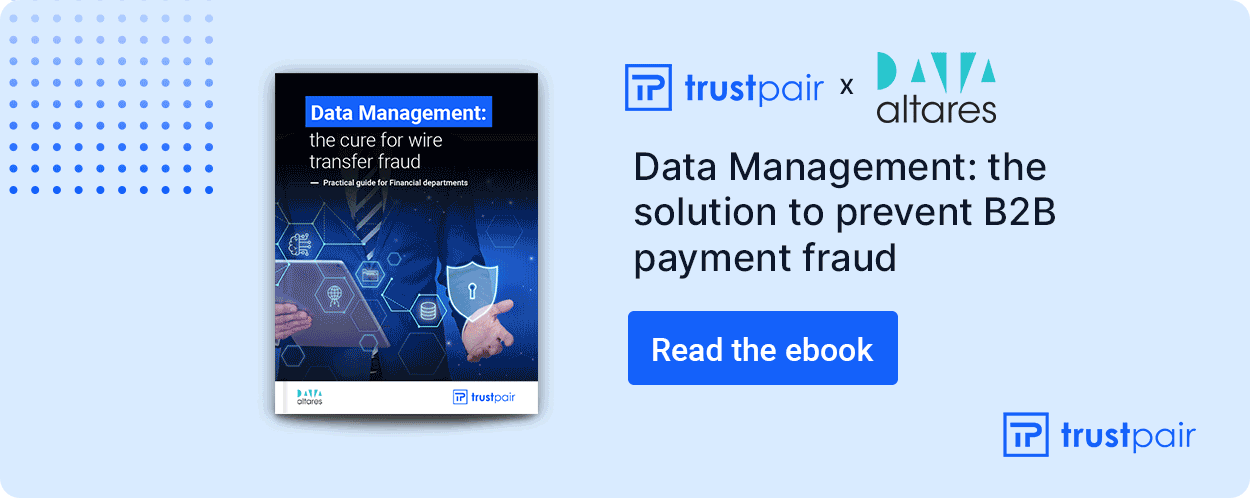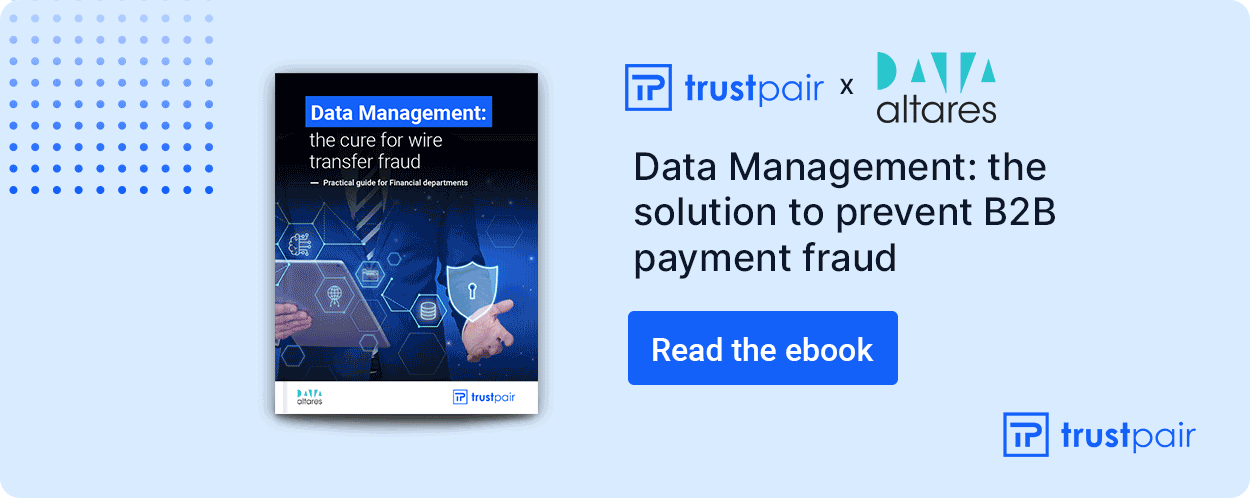Trustpair and Altares are proud to announce the release of their brand new white paper “Data Management: the cure for wire transfer fraud” to support Financial Departments in their Data Management strategy and the fight against credit transfer fraud. Between figures, findings, studies, experts’ testimonies and instructions, find out how to master the concepts and the related issues.
In summary of this practical guide:
While ¼ of companies suffered a fraud in 2020 with an average loss of €100K, strengthening the security of control processes is becoming urgent. What if the antidote to credit transfer fraud lay in better data management?
Data management is essential for informed decision-making and strong process security. It involves mastering several stages such as data collection, storage and qualification. Digital environments are becoming more open and the various departments must work together. It is time to make data more reliable. Finance departments must reinforce the relevance and efficiency of their data management strategy and processes.
Sensitive and at risk, data is also the object of covetousness from ill-intentioned individuals. Making it reliable over time is a major challenge. This guide focuses on the environment in which data evolves, and gathers the best practices to adopt to ensure a sustainable control and monitoring of your data over time.
Data Management and governance: a strategic issue for Financial departments
“Data Management is the consistent and coherent management of data within an organisation.” – Michael Lisch, Altares
Data Management is the set of processes, tools and methodologies for collecting, qualifying, storing, using and securing data within an organization. A successful Data Management strategy is synonymous with more informed decision-making, an increased ability to optimize costs and bring innovative products to market.
Data Management is an integral part of the data value chain: from the data infrastructure to be deployed to Master Data Management, including data modeling and integration. Originally mainly handled and used by financial departments, we can see a shift in trends in its use and processing, gradually adopted by various departments within the company.
The trend towards the dispersion and fragmentation of data sources within the company is a major one. Even if data hubs can facilitate and rationalise the “Data Management” approach of managers and Information Systems Directors (ISDs), all employees and all business units must be mobilised.
In order to ensure a good understanding and efficient sharing of data, while avoiding conflicts of interest, a 360° vision must be applied if all projects are to be carried out in the best possible conditions. It would be a serious mistake to apply an ultra-centralising vision, where one person (or department) would be responsible for all the issues related to data.
“Data Management and data governance involve real internal consultation between the business divisions. It is necessary to ensure a common understanding to achieve a satisfactory result.” Betty Sfez, Cabinet Solegal
Smart Data: when quality and reliability take precedence over volume
In view of the important issues related to data security for financial departments, a major challenge is emerging: redefining the use of data for greater reliability.
Unlike Big Data, which is based on a large volume of data, the Smart Data approach is based on the quality of the available data sets. From this point of view, financial departments seek to identify which data they need to process and for what purpose.
At the same time, they pay particular attention to the internal and external processes and technologies available to them in order to guarantee the highest possible level of reliability. Contrary to the concept of datalakes, vast warehouses of poorly structured and sometimes irrelevant and usable data.
As datalakes are obsolete and outdated, Smart Data is the future of Data Management thanks to other innovative integration solutions (improved reporting, real-time monitoring, more relevant decisions and better management of skills), extending the possibilities of exploitation and the benefits generated.
The complexity of managing this sensitive data requires Finance Departments to take certain precautions against the risks of fraud and other cyber-attacks that threaten them, such as: mapping internal data flows, implementing an identity and access management strategy, and implementing alert thresholds.
“Today, we know how to process data technologically, whereas years ago, we were unable to do so. And this is because technology offers this opportunity at affordable costs, to such an extent that the control and use of data becomes an opportunity for Financial departments” – Laurent Morel, PwC
Securing and controlling third-party data to combat (cyber) fraud
In order to properly process these two types of data, the following methodology, recommended by Altares, has four distinct phases:
- Creation: ensure that the information does not already exist in the database to prevent data inconsistencies
- Data enrichment: fill in all the necessary information, particularly when adding a third party: company name, address, VAT number, activity code, capital links
- Updating data: a company may change its address, manager, company registration number/SIRET, etc. These changes are made outside the company’s field of vision and may lead to payment errors or increased delays.
- Reliability of existing data: standardising data throughout the business relationship, according to various standards, to ensure that it is always correct and does not lose quality.
It is only then that this exploitation can reveal itself as a real relevant resource.
(Cyber)fraud, which has been on the rise in recent years, particularly since the health crisis, is a real scourge that can prove fatal at the slightest blow to the company that was inadvertent enough not to use the measures and solutions necessary to protect itself from it. Identity theft, ransomware, data theft, intrusions… attacks and fraud do not spare information systems.
“Cybersecurity is a matter of use and training. We need to raise awareness and give employees the means to secure their Internet access, even when they are working outside. Most cybersecurity problems are caused by human error” – Fanny Rabouille, Grenoble Management School
Among the essential but too often neglected precautions, we can mention continuous monitoring processes, perfect communication between the departments concerned, systematic auditing, updating of repositories, resources to deal with cybercrime coupled with processes, etc., but that’s not all.
Trustpair secures your data, prevent fraud and ensure reliable data
Trustpair supports the financial departments of midcaps and large groups in securing and making their third-party data reliable, automating the control of bank details and fighting fraud.
With the solution, financial teams are assured of working with reliable and quality third-party data in order to control each stage of the Procure-to-Pay process. With multiple checkpoints along the payment chain and continuous auditing of the third-party repository, data is automatically updated, corrected and enhanced in real time.
With the help of experts, this white paper aims to give you a better understanding of the challenges associated with data management and the impact of data control on the risk of credit transfer fraud:
- What is Data Management?
- What is its legal framework?
- What management model are financial departments moving towards?
- How can third-party data be made reliable?
Discover the answers to these questions in this practical guide from Trustpair and Altares. Get it now to learn more about the challenges of Data Management and the fight against fraud!






